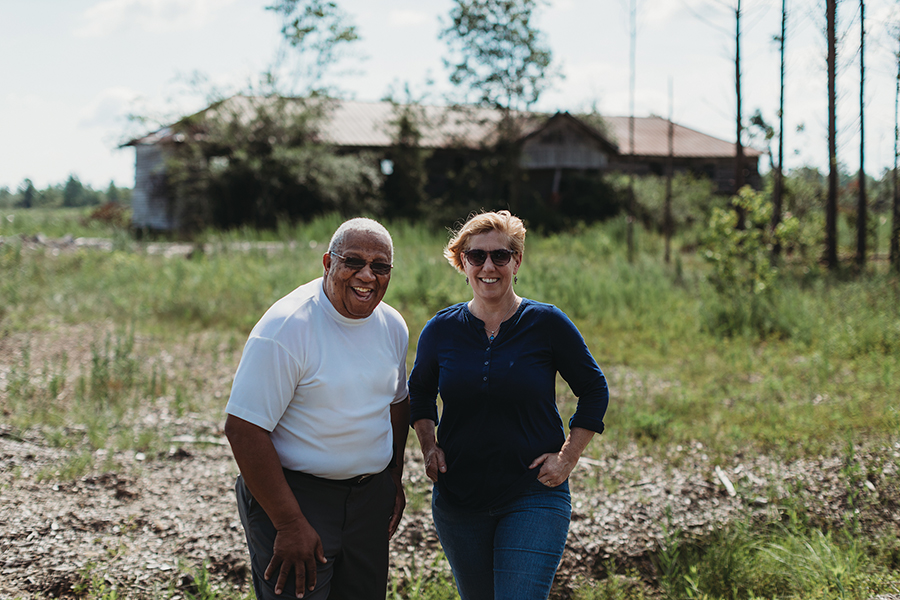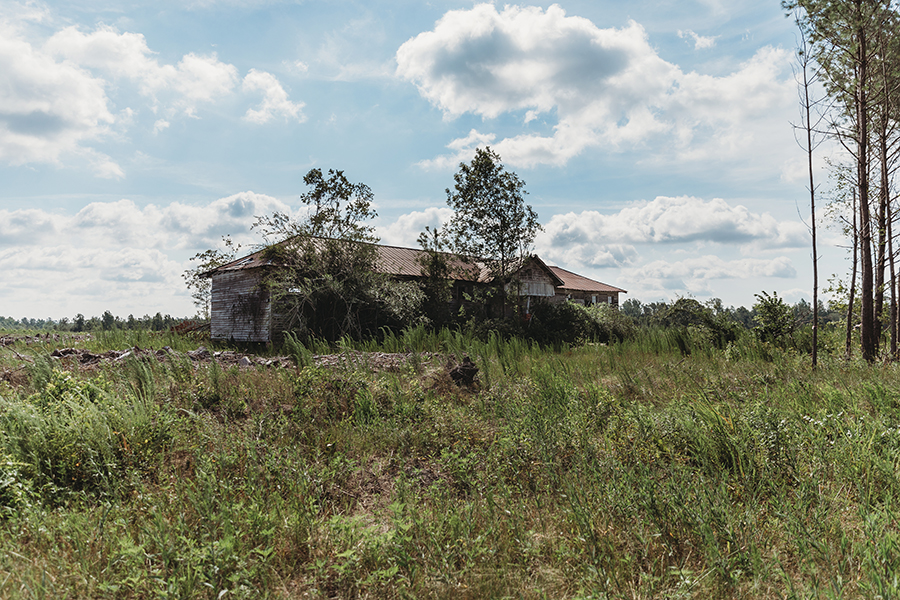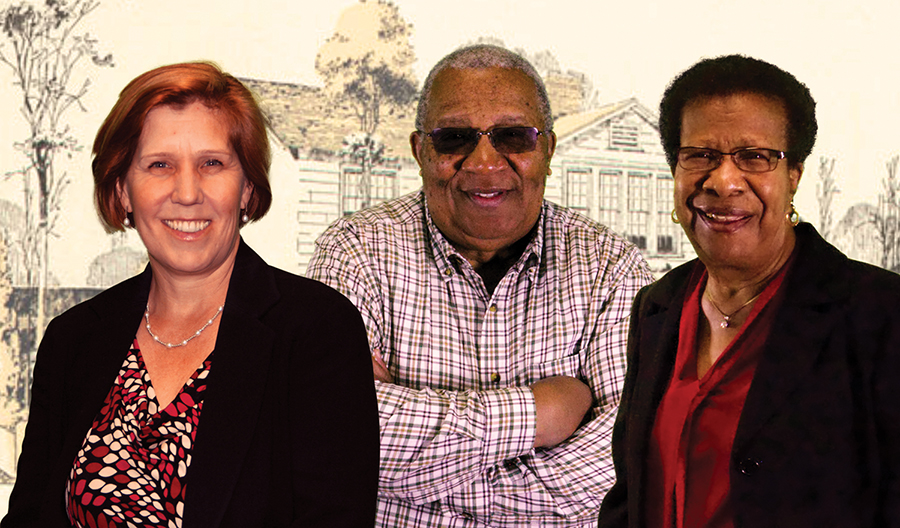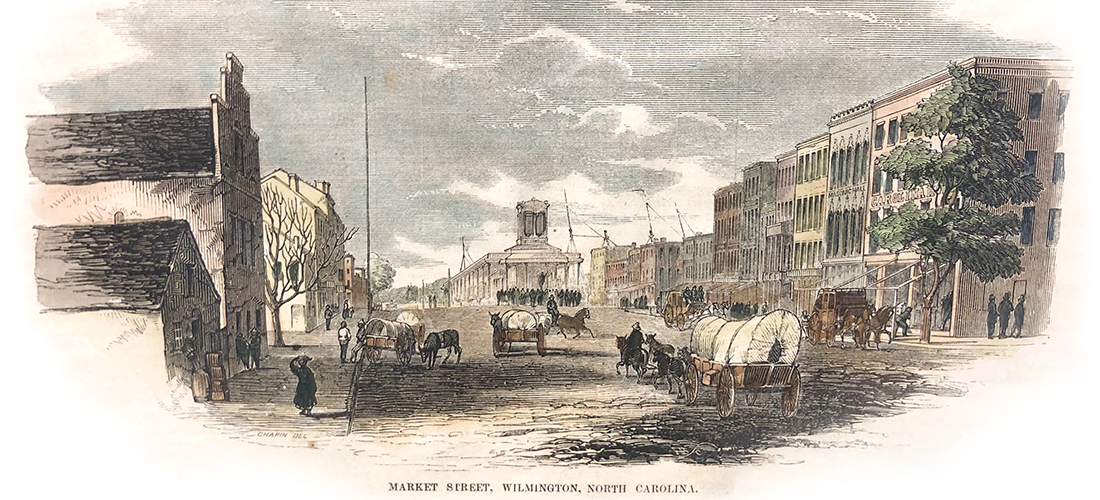A trio of dedicated educators is on a mission to reveal the legacy of Rosenwald Schools in Pender County
By Virginia Holman • Photographs By Mallory Cash

Dr. Richard Newkirk, Claudia Stack
Documentary filmmaker Claudia Stack has lived in rural Pender County since 1998. For much of her career she has worked in education, first as an academic advisor at UNCW, and later as a public school teacher. She says she came to documentary work unexpectedly.
In the spring of 2004, Stack and UNCW professor Tom Schmid worked on a commemoration of the 50th anniversary of the Brown v Board of Education decision. “So I took a small group of undergrads and started to look into what it was like to go to school here in the Cape Fear region at the time of segregation,” she says. “Around that time, I became aware that some of the old wooden buildings that I would drive by in Pender County were actually schools.” So she started talking to her neighbors and began reaching out to alumni of those schools.

Those conversations, some which have continued for 15 years, resulted in Stack’s award-winning film, Under the Kudzu, which was largely shot and edited by former UNCW student Lyndon Kyle Holt. Stack also published a companion book for the film, titled Rosenwald School Reflections. Finally, along with two lifelong educators and Pender County Rosenwald school alumni, Dr. Richard Newkirk and Mrs. Betty B. Thompson, Stack offers presentations about the profound history and legacy of African-American educational excellence in Pender County, North Carolina.
At the beginning of Under the Kudzu, Stack’s meticulously researched documentary, viewers learn that “in the early 1920s, Pender County built six brick schools for whites, and provided centralized transportation to these schools . . . However, black children walked, sometimes up to five or six miles, to attend small primary schools scattered throughout the county.”
Although African-Americans in Pender County paid taxes used to fund public schools for whites only, racial segregation policies, commonly known as “Jim Crow laws,” prevented black children from attending the very schools their families’ tax dollars had helped build. Despite these discriminatory laws, African-American communities in Pender and the segregated South often found innovative ways to provide schools for their children.
These schools were often funded by knocking on the doors of each black family in the county, many of whom were sharecropping families laboring at wages “between 50 cents to $2 per day.” As Stack points out in Rosenwald School Reflections, this fundraising was, in essence, a form of double taxation. Even so, community members gave what they could, pooled their funds, procured land and sometimes collaborated with places of worship and civic groups.
The results were impressive. By 1936 in Pender County, African-Americans had built 30 public schools; 15 of which were built with partial support from a program known as the Rosenwald Fund.
During segregation, the Rosenwald Fund was a tremendous resource for African-American communities that hoped to build schools. The brainchild of Booker T. Washington of the Tuskegee Institute, and funded by philanthropist and Sears Roebuck & Co. president Julius Rosenwald, this innovative funding program ran from 1913-1932, and provided matching funds and building plans to African-American communities in the South that wanted schools. (Preservationists note that buildings once used as Rosenwald schools are often identifiable by their classic, northeast-facing “nine over nine” paned windows, which were designed to maximize natural light in rural areas with limited or nonexistent electricity.)
According to Stack, black communities usually donated 20-25 percent of the cost, and often contributed land and labor. There was a caveat: In order for the funds to be disbursed, communities had to get the local school board “to agree to operate the school as a public school.”

Claudia Stack, Dr. Richard Newkirk, Betty B. Thompson
Stack says the reasons the Rosenwald Fund required having local school boards own and operate Rosenwald-funded schools were both philosophical and practical. “The fund wanted to push Southern school boards, whose members were typically all European-American, to take more responsibility for educating African-American students,” she says. “It brought more African-American schools under the public umbrella, pushing local government to serve those students, albeit within the confines of segregation.” In addition, she says, it helped provide uniform standards for teachers.
However, she points out that black teachers typically received 65 percent of the pay of their white counterparts, though they had to meet the same qualifications. Stack calls the Rosenwald requirement to sign over schools built by black families for black children to the public school board “a huge leap of faith.”
It is hard to imagine the trepidation that many black community members at that time must have experienced. Particularly, Stack says, “after raising money and donating land/labor/materials handing over the schools to a public school system that had not served their children well in the past.” She points out that the “African-American community in Canetuck had requested and been denied a public school by the board three times.”
It was only after raising $1,226 and securing a Rosenwald grant that they were able to leverage school board approval. All told, 813 Rosenwald schools were built in the state of North Carolina and represent what Stack says is North Carolina’s African-American communities’ “extreme dedication to education.”
Now, Stack, alongside esteemed retired educators and Rosenwald school alumni Dr. Richard Newkirk and Betty Thompson, is working to increase awareness of history and value of not just the Rosenwald school legacy, but also the contributions and sacrifices that African-American communities made during segregation to make sure education was available to all, noting contributions that shaped the history of public school education in the South. Their presentation, “Lessons from the Rosenwald Schools,” focuses both on the history and the pedagogical techniques used in these schools.
Dr. Richard Newkirk attended several Rosenwald schools in Pender: Halfway Branch Elementary, West Pender Elementary, and C.F. Pope High School. He graduated from NC A&T in 1969. Betty Thompson attended Canetuck Elementary and Pender County Training School, and received her college degree from Winston Salem State University.
Growing up in segregated Pender County, Newkirk describes school as the safest environment that he had as a child. He particularly remembers the high expectations of the teachers, many of whom had received degrees at places like Hampton University in Virginia and Columbia University in New York.
“Our teachers weren’t there to hear complaints, they were there to educate us,” he says. “They also taught us how to deal with life.” Newkirk says that teachers addressed the issues and problems of racist segregation policies plainly. In order to educate, teachers validated some of what black students at the time often already knew about institutional racism in the segregated South: “That you’d have to work twice as hard and know twice as much to earn half the pay but they also said here are tools to help you move forward and deal with life successfully.”
Newkirk says the focus in the schools he attended was squarely on solutions that provided each child with the best possible environment in which to learn, and the best available teachers, methods, and resources they could obtain. The teachers also provided students with an environment that Newkirk calls “love in action.” To create a safe environment where students could learn, he recalls that teachers would minister to the needs of the student by getting to know them.
“For example,” Newkirk says, “if a child was hungry, they might not tell a teacher, but a teacher would know, and the teachers would make sure you got what you needed without drawing attention to it, and then moved on so you could learn.”
Mrs. Betty Thompson, who spent 37 years as an elementary school teacher and holds two master’s degrees, attended the Canetuck School and then Pender County Training School. She credits the education she received from the teachers there with positioning her well for college: “My main goal in school was to get that education, because that is what the teachers stressed.” She says that without the school, her options would have been much more limited, and that she didn’t want to wind up “working in the sun.”
“I knew from my teachers that my education was important and that my life would be improved with a good education because I would have more choices,” she says. Thompson also speaks of the importance of the Pender County Rosenwald schools as “feeder schools” to historically black colleges and universities in the South. She says that the teachers at these schools were well-educated African-American role models who not only inspired their students but showed them, by example, the power of an education to change their lives and the lives of those around them. Thompson says one teacher in particular, Helen Foy Hall, inspired her decision to pursue education as a career.
Dr. Newkirk also cites one of his teachers, Mr. Clarence Calvin Cooper, as a strong influence: “Mr. Cooper was the first male teacher I ever had. I didn’t realize how big an influence he had been until I started teaching. We could never give him simply an answer, we had to explain how we came to an answer.”
Stack points out that the history and the influence of the Rosenwald schools and its impact on public education isn’t as widely known today as it should be, even in the South.
Newkirk agrees. “Today,” he says, “we take for granted that education is for everybody.” And that was not the mindset during segregation or even for some years after Brown v Board of Education. Stack, Newkirk, and Thompson want people to know the stories of how African-American communities in Pender, North Carolina, and the South came together and built schools despite pernicious racism and segregation, and how those schools afforded their children with strong educational communities, opportunities for better careers, and better lives. African-American communities like those in Pender County left us with an enduring and treasured legacy, something we too often take for granted today: the right to a good public education for all. b
Under the Kudzu is available on Amazon Prime video.
Claudia Stack will give a talk at Poplar Grove Plantation in Hampstead on September 21 from 1-3:30pm. For more information, visit stackstories.com.
Author and creative writing instructor Virginia Holman lives and writes in Carolina Beach.


